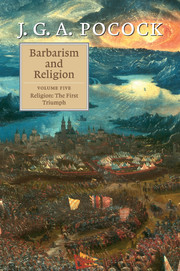Book contents
- Frontmatter
- Contents
- Preface
- Acknowledgements
- Advice to readers
- List of abbreviations
- Introduction
- PART I GIBBON'S ORTHODOX SOURCES
- PART II THE SOURCES OF PROTESTANT ENLIGHTENMENT
- 3 Jean Le Clerc and the history of language
- 4 The Historia Ecclesiastica and the later works of Le Clerc
- 5 Isaac de Beausobre: heresy, philosophy, history
- 6 Johann Lorenz von Mosheim: modern ecclesiastical historian
- PART III THE TWO CHAPTERS EXPLORED
- PART IV CONTROVERSY AND CONTINUATION
- Bibliography
- Index
3 - Jean Le Clerc and the history of language
Published online by Cambridge University Press: 01 March 2011
- Frontmatter
- Contents
- Preface
- Acknowledgements
- Advice to readers
- List of abbreviations
- Introduction
- PART I GIBBON'S ORTHODOX SOURCES
- PART II THE SOURCES OF PROTESTANT ENLIGHTENMENT
- 3 Jean Le Clerc and the history of language
- 4 The Historia Ecclesiastica and the later works of Le Clerc
- 5 Isaac de Beausobre: heresy, philosophy, history
- 6 Johann Lorenz von Mosheim: modern ecclesiastical historian
- PART III THE TWO CHAPTERS EXPLORED
- PART IV CONTROVERSY AND CONTINUATION
- Bibliography
- Index
Summary
GIBBON'S CHOICE OF AUTHORITIES
The origins and progress of Gibbon's interest in ecclesiastical history are ill-documented, and like much else in the history of his scholarship and work methods, difficult to reconstruct. The subject appears in the composition of the Essai sur l'étude de la littérature and may well have been in his mind as a student in Lausanne. There are signs of it in his journals between 1759 and 1764, but these are never resumed after his arrival in Rome, and his letters are uninformative as regards his studies. The catalogue of his library reveals many holdings in this area, but does not relate his acquisition or use of any book in addition to its date of publication; and while the footnotes of the Decline and Fall tell us much, they do not reveal his use of what he read. Pending the research which might illuminate this matter, we select works that he read, in the hope of furnishing his text with contexts. As we do so, and particularly as we move from his Catholic to his Protestant sources, we begin to encounter the phenomena we will want to call Enlightenment; for the processes we study under that name are predominantly Protestant. There is a Catholic Enlightenment, with a history of its own, but he did not know of it. Gibbon's references go back as much as 100 years, and are often to works published before his birth.
- Type
- Chapter
- Information
- Barbarism and Religion , pp. 89 - 114Publisher: Cambridge University PressPrint publication year: 2011



